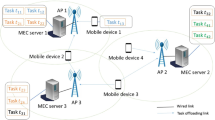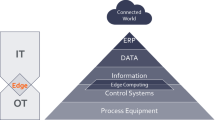Abstract
With the rapid growth of user equipment (UE), the amount of data transmitted over networks has become enormous, exerting immense pressure on backbone networks and central cloud infrastructures. Simultaneously, corresponding applications requiring high energy consumption and low latency have multiplied the requirements for UE. Mobile edge computing (MEC) has been proposed to support the offloading of UE tasks to edge clouds for execution. The implementation of MEC requires fast data transmission between UE and edge servers, and the emerging 5G network appears to render this technology possible. In this paper, considering a large number of UE, a fixed MEC server, and an advanced intelligent network, we suggest an intelligent overclocking mechanism for the MEC server that operates for an intelligently calculated period to allow it to leverage more computing power without introducing additional hardware resources for a certain period of time. We jointly manage task offloading, server resource allocation, and overclocking to minimize the system-wide computation overhead and other risks. The proposed optimization problem is a mixed-integer nonlinear programming problem that is divided into three subproblems: offloading decision, resource allocation, and overclocking decision. We solve these subproblems using non-convex techniques and provide an iterative algorithm to obtain a heuristic solution for the original problem. Finally, simulation results show that the overclocked MEC server has lower system-wide computation overhead, faster task processing, and more offloaded UE as compared with the case without overclocking.
Similar content being viewed by others
References
Atat R, Liu L, Chen H, et al. Enabling cyber-physical communication in 5G cellular networks: challenges, spatial spectrum sensing, and cyber-security. IET Cyber-Phys Syst Theor Appl, 2017, 2: 49–54
Ning Z, Huang J, Wang X. Vehicular fog computing: enabling real-time traffic management for smart cities. IEEE Wirel Commun, 2019, 26: 87–93
Reddy K Y, Gandhi N V D, Balachander K. Simulation and analysis of performance models of broadband intelligent mobile networks. In: Proceedings of 2007 International Conference on Signal Processing, Communications and Networking, 2007. 573–578
Jiang W, Strufe M, Schotten H D. Intelligent network management for 5G systems: the selfnet approach. In: Proceedings of 2017 European Conference on Networks and Communications (EuCNC), 2017. 1–5
Liu F M, Shu P, Jin H, et al. Gearing resource-poor mobile devices with powerful clouds: architectures, challenges, and applications. IEEE Wirel Commun, 2013, 20: 14–22
Chiang M, Zhang T. Fog and IoT: an overview of research opportunities. IEEE Internet Things J, 2016, 3: 854–864
Lin J, Yu W, Zhang N, et al. A survey on Internet of Things: architecture, enabling technologies, security and privacy, and applications. IEEE Internet Things J, 2017, 4: 1125–1142
Sabella D, Vaillant A, Kuure P, et al. Mobile-edge computing architecture: the role of MEC in the Internet of Things. IEEE Consumer Electron Mag, 2016, 5: 84–91
Corcoran P, Datta S K. Mobile-edge computing and the Internet of Things for consumers: extending cloud computing and services to the edge of the network. IEEE Consumer Electron Mag, 2016, 5: 73–74
Sun X, Ansari N. EdgeIoT: mobile edge computing for the Internet of Things. IEEE Commun Mag, 2016, 54: 22–29
Zhang G, Chen Y, Shen Z, et al. Distributed energy management for multiuser mobile-edge computing systems with energy harvesting devices and QoS constraints. IEEE Internet Things J, 2019, 6: 4035–4048
Abbas N, Zhang Y, Taherkordi A, et al. Mobile edge computing: a survey. IEEE Internet Things J, 2018, 5: 450–465
Mach P, Becvar Z. Mobile edge computing: a survey on architecture and computation offloading. IEEE Commun Surv Tutorials, 2017, 19: 1628–1656
Shan X, Zhi H, Li P, et al. A survey on computation offloading for mobile edge computing information. In: Proceedings of 2018 IEEE 4th International Conference on Big Data Security on Cloud (BigDataSecurity), IEEE International Conference on High Performance and Smart Computing (HPSC), and IEEE International Conference on Intelligent Data and Security (IDS), 2018. 248–251
Kosmides P, Lambrinos L. Intelligent routing in mobile opportunistic networks. In: Proceedings of 2018 Global Information Infrastructure and Networking Symposium (GIIS), 2018. 1–4
Alameddine H A, Sharafeddine S, Sebbah S, et al. Dynamic task offloading and scheduling for low-latency IOT services in multi-access edge computing. IEEE J Sel Areas Commun, 2019, 37: 668–682
Ning Z, Dong P, Kong X, et al. A cooperative partial computation offloading scheme for mobile edge computing enabled Internet of Things. IEEE Internet Things J, 2019, 6: 4804–4814
Wang H, Li X, Ji H, et al. Federated offloading scheme to minimize latency in mec-enabled vehicular networks. In: Proceedings of 2018 IEEE Globecom Workshops (GC Wkshps), 2018. 1–6
Bi S, Zhang Y J. Computation rate maximization for wireless powered mobile-edge computing with binary computation offloading. IEEE Trans Wireless Commun, 2018, 17: 4177–4190
Li S, Tao Y, Qin X, et al. Energy-aware mobile edge computation offloading for IOT over heterogenous networks. IEEE Access, 2019, 7: 13092–13105
Cui L, Xu C, Yang S, et al. Joint optimization of energy consumption and latency in mobile edge computing for Internet of Things. IEEE Internet Things J, 2019, 6: 4791–4803
Bu S, Yu F R. Green cognitive mobile networks with small cells for multimedia communications in the smart grid environment. IEEE Trans Veh Technol, 2014, 63: 2115–2126
Pham Q V, Le L B, Chung S H, et al. Mobile edge computing with wireless backhaul: joint task offloading and resource allocation. IEEE Access, 2019, 7: 16444–16459
Siddique U, Tabassum H, Hossain E, et al. Wireless backhauling of 5G small cells: challenges and solution approaches. IEEE Wirel Commun, 2015, 22: 22–31
Ge X, Cheng H, Guizani M, et al. 5G wireless backhaul networks: challenges and research advances. IEEE Netw, 2014, 28: 6–11
Tran T X, Pompili D. Joint task offloading and resource allocation for multi-server mobile-edge computing networks. IEEE Trans Veh Technol, 2019, 68: 856–868
Zhang J, Hu X, Ning Z, et al. Energy-latency tradeoff for energy-aware offloading in mobile edge computing networks. IEEE Internet Things J, 2018, 5: 2633–2645
Thomas D, Shanmugasundaram M. A survey on different overclocking methods. In: Proceedings of the 2nd International Conference on Electronics, Communication and Aerospace Technology (ICECA), 2018. 1588–1592
Wu F, Chen J, Dong Y, et al. Improve energy efficiency by processor overclocking and memory frequency scaling. In: Proceedings of 2018 IEEE 20th International Conference on High Performance Computing and Communications, IEEE 16th International Conference on Smart City, IEEE 4th International Conference on Data Science and Systems (HPCC/SmartCity/DSS), 2018. 960–967
Jang H B, Lee J, Kong J, et al. Leveraging process variation for performance and energy: in the perspective of overclocking. IEEE Trans Comput, 2014, 63: 1316–1322
Short M, Sheikh I. Dual-rate overclocking in can networks: a soft-core controller prototype. In: Proceedings of 2010 Seventh International Conference on Networked Sensing Systems (INSS), 2010. 314–317
Zhao K, Li J P, Ma J, et al. Overclocking NAND flash memory I/O link in LDPC-Based SSDs. IEEE Trans Circ Syst II, 2014, 61: 885–889
Wang C, Yu F R, Liang C, et al. Joint computation offloading and interference management in wireless cellular networks with mobile edge computing. IEEE Trans Veh Technol, 2017, 66: 7432–7445
Acknowledgements
This work was supported by National Natural Science Foundation of China (Grant Nos. 61672395, 61972448, 61911540481), Fund of Hubei Key Laboratory of Inland Shipping Technology (Grant No. NHHY2019004), and National Research Foundation of Korea (NRF) Grant Funded by the Korea Government (MSIT) (Grant No. 2019K2A9A2A060-24389).
Author information
Authors and Affiliations
Corresponding author
Rights and permissions
About this article
Cite this article
Wang, K., Xiong, Z., Chen, L. et al. Joint time delay and energy optimization with intelligent overclocking in edge computing. Sci. China Inf. Sci. 63, 140313 (2020). https://doi.org/10.1007/s11432-019-2780-0
Received:
Revised:
Accepted:
Published:
DOI: https://doi.org/10.1007/s11432-019-2780-0




